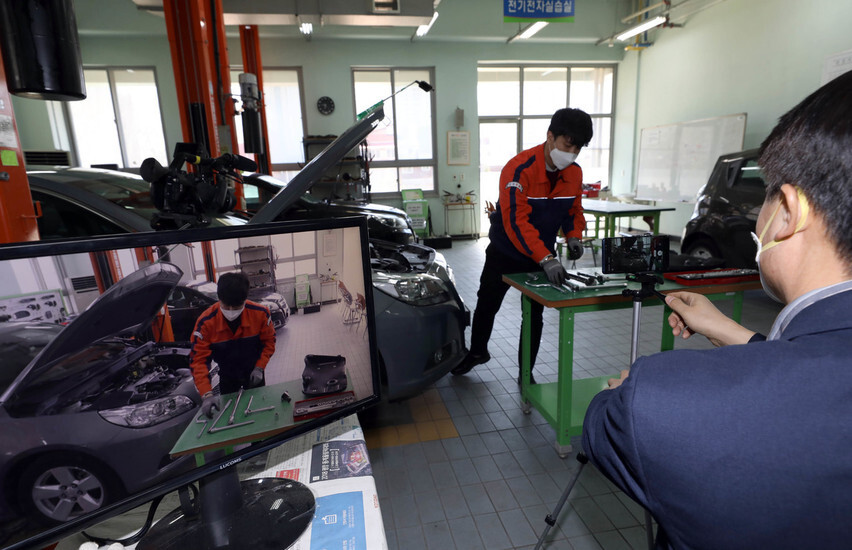hankyoreh
Links to other country sites 다른 나라 사이트 링크
S. Korean middle, high schools begin online classes for around 850,000 third-year students

On Apr. 9, the spring semester begins online for students in the third year of high schools and the third year of middle schools around South Korea. Since this approach was hastily developed as an emergency measure amid the COVID-19 pandemic, there will almost inevitably be complaints about inconvenience in the virtual classroom for some time to come.
The first phase of the online semester involves some 440,000 students in the third year of high school and 410,000 students in the third year of middle school around the country. The online semester will begin for the first and second years of middle and high school and the fourth, fifth, and sixth grades of elementary school on Apr. 16 and for the first, second, and third grades of elementary school on Apr. 20.
Since these remote classes are still part of the official curriculum, students are expected to perform their studies according to a predetermined schedule. What follows is the class schedule for third-year students at one high school. First period is literature, in which students watch a lecture on EBS and then post to a message board online; second and third period are math, combining lectures and problem solving; fourth period is physical education, in which students exercise while watching a video with other people in their class; fifth period is a research topic, in which students watch a lecture of their choice and then prepare a glossary of terms; and sixth period is another round of math, in which students watch a preparatory lecture about the Korean university entrance exam and have a question and answer session in each subject’s chatroom.
But since students aren’t obliged to attend the distance classes in real time, as they would at school, they’re likely to be given the discretion to manage their own studies. Rather than insisting on interactive classes in real time, teachers are likely to provide an appropriate mixture of video lectures to watch and assignments to do.
Education MInistry announces rules for secure remote learning
On Apr. 8, one day before the online semester began, the Ministry of Education and the Ministry of Science and ICT announced 10 rules that teachers and students are supposed to follow in remote learning. Some of the rules focus on maintaining the safety of online instruction. For example, users are recommended to set passwords on video chatrooms set up for real-time classes, not use mobile apps with poor security, and not open text messages or emails from strangers. Other rules aim to avoid speed bumps in the virtual classroom by having users log on to educational websites in advance and upload and download materials the previous day.
Concerns have been raised that students might take pictures or videos of their teachers or friends during remote classes without permission and pass around the recordings for prurient purposes. That led the authorities to include a rule that bans unauthorized video or image recording and the distribution of any recordings, even if authorized.
Earlier, the Ministry of Education announced measures to protect teachers’ personal information and preserve their authority in online classes. Under these measures, students who disrupt educational activities can face disciplinary measures, up to and including expulsion, under the Teacher’s Status Improvement Act. One example of such disruption is passing around images taken during class in which the teacher’s face has been doctored or distorted.
Other concerns are whether all students will have smart devices capable of logging into the online classes and whether internet servers will be able to handle the surge of people connecting simultaneously. “We have enough smart devices to lend to all underprivileged students, and EBS and other companies have finished upgrading their servers to support simultaneous access by 3 million people,” said an official at the Ministry of Education.
“Starting the semester online right now is pretty much a last-resort measure. But a lot of teachers are determined to take this as an opportunity to increase the quality of education, one way or another,” said a teacher at a high school in Seoul.
By Choi Won-hyung and Lee Yu-jin, staff reporters
Please direct comments or questions to [english@hani.co.kr]

Editorial・opinion
![[Column] When ‘fairness’ means hate and violence [Column] When ‘fairness’ means hate and violence](https://flexible.img.hani.co.kr/flexible/normal/500/300/imgdb/original/2024/0516/7417158465908824.jpg) [Column] When ‘fairness’ means hate and violence
[Column] When ‘fairness’ means hate and violence![[Editorial] Yoon must stop abusing authority to shield himself from investigation [Editorial] Yoon must stop abusing authority to shield himself from investigation](https://flexible.img.hani.co.kr/flexible/normal/500/300/imgdb/original/2024/0516/4417158464854198.jpg) [Editorial] Yoon must stop abusing authority to shield himself from investigation
[Editorial] Yoon must stop abusing authority to shield himself from investigation- [Column] US troop withdrawal from Korea could be the Acheson Line all over
- [Column] How to win back readers who’ve turned to YouTube for news
- [Column] Welcome to the president’s pity party
- [Editorial] Korea must respond firmly to Japan’s attempt to usurp Line
- [Editorial] Transfers of prosecutors investigating Korea’s first lady send chilling message
- [Column] Will Seoul’s ties with Moscow really recover on their own?
- [Column] Samsung’s ‘lost decade’ and Lee Jae-yong’s mismatched chopsticks
- [Correspondent’s column] The real reason the US is worried about Chinese ‘overcapacity’
Most viewed articles
- 1Could Korea’s Naver lose control of Line to Japan?
- 2[Column] Welcome to the president’s pity party
- 3[Column] US troop withdrawal from Korea could be the Acheson Line all over
- 4Naver’s union calls for action from government over possible Japanese buyout of Line
- 5[Editorial] Korea must respond firmly to Japan’s attempt to usurp Line
- 6Korea cedes No. 1 spot in overall shipbuilding competitiveness to China
- 7[Editorial] Yoon must stop abusing authority to shield himself from investigation
- 8[Column] When ‘fairness’ means hate and violence
- 9Korean opposition decries Line affair as price of Yoon’s ‘degrading’ diplomacy toward Japan
- 10Second suspect nabbed for gruesome murder of Korean in Thailand, 1 remains at large